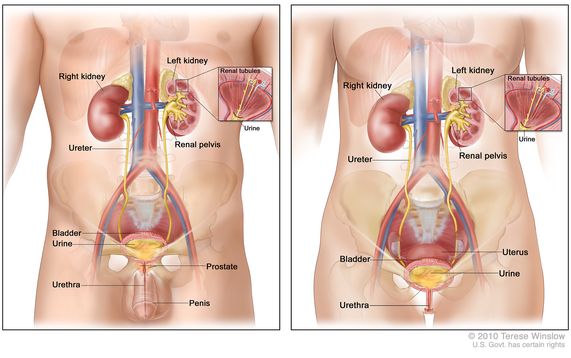Just how to Set Apart In Between Kidney Stones vs UTI: Trick Variables and Analysis Tips
Just how to Set Apart In Between Kidney Stones vs UTI: Trick Variables and Analysis Tips
Blog Article
Checking Out the Effects and Causes of Kidney Stones in Comparison to Urinary System Infections: A Comprehensive Overview
The exploration of kidney stones and urinary system tract infections (UTIs) exposes an intricate interplay of signs and underlying reasons that warrant cautious exam. While both conditions can cause hematuria, they offer distinct medical attributes and arise from different etiological aspects. Recognizing the nuances of each condition is critical for effective diagnosis and administration. What are the vital distinctions in their symptoms, and exactly how might these notify therapy approaches? The response to these inquiries might supply vital insights right into the avoidance and care of these common urological concerns.
Review of Kidney Stones
Kidney rocks, also called kidney calculi, type when particular substances in the pee crystallize and aggregate, resulting in the advancement of tough deposits within the kidneys. These rocks can vary in size, varying from a grain of sand to a golf round, and can be made up of different products, the most common being calcium oxalate, uric acid, struvite, and cystine. The formation of kidney stones is affected by several factors, consisting of dietary behaviors, liquid intake, and genetic predisposition.
Signs and symptoms of kidney rocks may include extreme discomfort in the back or side, blood in the urine, nausea, and frequent peeing, especially as the stone relocates via the urinary tract. Medical diagnosis commonly includes imaging research studies such as ultrasound or CT scans, alongside urinalysis to recognize the stone's composition.
Therapy choices vary based upon the size and sort of rock, as well as the extent of signs (Kidney Stones vs UTI). Small rocks may pass normally with boosted fluid consumption, while larger rocks may call for medical treatments such as lithotripsy or surgical elimination. Comprehending the pathophysiology and risk aspects related to kidney rocks is vital for effective avoidance and management
Review of Urinary System Infections
Urinary tract infections (UTIs) prevail bacterial infections that influence any type of component of the urinary system, including the kidneys, ureters, bladder, and urethra. They mainly occur when germs, frequently from the stomach tract, go into the urinary system, bring about inflammation and infection. UTIs are classified right into two major types: complex and uncomplicated. Straightforward UTIs typically happen in healthy and balanced people with normal urinary system systems, while complicated UTIs may develop in people with underlying conditions, such as architectural problems or compromised immune systems.
The occurrence of UTIs is especially greater in females than men, primarily due to anatomical differences, such as a shorter urethra. Danger aspects consist of sex-related task, particular contraceptive approaches, urinary system retention, and dehydration. The medical diagnosis of UTIs is generally confirmed through urine tests, which might disclose the visibility of microorganisms, leukocyte, or red cell.

Symptoms of Kidney Stones
The discomfort connected with kidney stones can show up in numerous methods, typically leading individuals to seek clinical interest. One of one of the most usual signs is severe pain, commonly local in the lower back or side, which might emit to the abdomen or groin. This discomfort, usually explained as sharp or cramping, can occur suddenly and might change in intensity.
In addition, individuals may experience hematuria, or blood in the pee, which can range from tiny total up to noticeable staining. This symptom might be gone along with by changes in urinary system habits, such as raised frequency or urgency, in addition to discomfort throughout urination. Queasiness and vomiting are likewise prevalent, usually resulting from the body's response to intense discomfort.
Sometimes, people may experience high temperature and cools, particularly if an additional infection creates due to the blockage created by the stones. Generally, the mix of severe pain, hematuria, modified urinary system patterns, and gastrointestinal signs can supply substantial insight into the existence of kidney rocks, necessitating prompt medical examination and treatment. Understanding these symptoms is important for prompt medical diagnosis and reliable management of reference the condition.
Signs of Urinary Tract Infections
Infections within the urinary system system usually offer a variety of distinctive symptoms that can considerably affect everyday life. One of the most typical signs and symptoms consist of a relentless impulse to pee, usually come with by a burning experience throughout peeing, called dysuria. People might likewise experience boosted regularity of peeing, creating little amounts of urine each time.
Other notable symptoms consist of fetid or over cast pee, which might suggest the existence of germs or pus. In some situations, urine might show up pink or red due to the presence of blood, a problem called hematuria. Furthermore, individuals may experience pelvic pain or stress, which can even more information more intensify the feeling of necessity.
Systemic symptoms might likewise manifest, such as fever, chills, and fatigue, particularly if the infection has actually ascended to the kidneys. It is essential to identify these symptoms early, as without treatment urinary system system infections can bring about a lot more extreme complications. Kidney Stones vs UTI. Trigger clinical attention is advised when these signs are observed, permitting proper analysis examination and therapy to reduce pain and stop additional wellness issues
Reasons of Each Problem
Frequently, kidney rocks and urinary system system infections occur from unique yet occasionally overlapping causes that can impact people in different ways. Dehydration, insufficient fluid consumption, and high-sodium diet regimens can exacerbate these conditions, promoting formation within the urinary system system.

Understanding these distinct causes is crucial for avoidance and therapy. Kidney Stones vs UTI. While way of life adjustments may reduce the risk of kidney rocks, ideal health and punctual treatment of urinary system infections are crucial for lowering their reappearance and connected problems
Conclusion
In summary, kidney rocks and urinary system tract infections existing unique signs and underlying causes. Kidney rocks are defined by severe discomfort and metabolic aspects, while urinary system infections mostly involve microbial infections causing urinary necessity and discomfort. Although both conditions can cause hematuria, their formation devices vary considerably. Understanding these distinctions is essential for reliable diagnosis and therapy, eventually boosting individual outcomes for those impacted by either problem.
The exploration of kidney stones and urinary system system infections (UTIs) exposes a complex official statement interplay of signs and symptoms and underlying reasons that call for cautious evaluation.Urinary system system infections (UTIs) are common bacterial infections that influence any part of the urinary system, including the kidneys, ureters, bladder, and urethra.Regularly, kidney rocks and urinary system tract infections emerge from unique yet sometimes overlapping causes that can affect people differently.In summary, kidney stones and urinary system system infections present distinctive signs and underlying causes. Kidney rocks are identified by extreme pain and metabolic aspects, while urinary system infections mostly include microbial infections leading to urinary system seriousness and pain.
Report this page